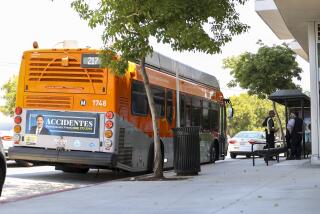U.S. stands by California bullet train project despite critics
The Obama administration vowed Thursday at a House committee meeting in Washington that it would not back down from its support of California’s bullet train project despite attacks from critics who alleged it is tainted by political corruption.
“We are not going to flinch on that support,” said Joseph Szabo, chief of the Federal Railroad Administration.
Szabo said that his agency had committed itself to provide $3.3 billion for a construction start next year in the Central Valley and that federal law prohibits any change of mind about where to begin building the first segment of the state’s high-speed rail system.
“The worst thing we could do is make obligations to folks and start to renege on our word,” Szabo told the House Transportation and Infrastructure Committee.
Szabo was grilled repeatedly about why the project was starting in the least populated region the route traverses, an area one East Coast politician asserted had “more cows and crops than people.” Szabo said it was the state’s application that determined where the money would be spent.
But that characterization of the decision-making process was sharply disputed by Rep. Devin Nunes (R-Tulare), whose district would be served by the rail line. Nunes led a charge of Republican criticism of the effort and claims that it would create tens of thousands of jobs.
“It is clear that high-speed rail is not about jobs,” Nunes said. “It is about corruption, public deception and bureaucratic experimentation.”
Nunes said the federal rail agency made a $700-million grant for the Central Valley construction segment on the eve of the 2010 election to benefit a local congressman, whom he did not name. The comment appeared to be aimed at Rep. Jim Costa (D-Fresno). Costa has pushed the project since his days in the California Legislature and then later when he was elected to Congress. A spokesman for Costa did not respond to a request for comment.
Nunes said the California High-Speed Rail Authority has spent $800 million over the last 15 years on studies, salaries and consultants without laying “a single inch of track.” He noted that the authority pays its chief executive $375,000 annually, more than Amtrak pays its top executive.
“The high-speed rail authority has bankrolled a vast array of political consultants to curry favor with elected officials,” Nunes said. “If the high-speed rail were widely supported, a multimillion-dollar PR campaign would not be necessary.”
Roelof van Ark, the rail authority’s chief executive, defended the decision to start in the Central Valley, saying high-speed rail systems around the world conventionally start construction in the center of their lines rather than at the end points. He cited the need to have a long section of rail to test the equipment before trains could run. “There is no where else in the country you could do this,” he said.
Szabo’s insistence that the federal government will not back down from its funding plan for the project was also a target of lawmakers.
Rep. Jeff Denham (R-Atwater) repeatedly questioned whether the federal rail agency would allow California to spend the $3.3 billion in grants if the state’s own funding under its $9.9-billion bond measure stopped. Denham is among a group of House Republicans trying to put a freeze on any federal spending and even to claw back existing grants.
At the same time, legal questions are growing about whether the rail project conforms to the requirements of the 2008 voter-approved bond measure.
In a separate action, the Bakersfield City Council adopted a resolution Wednesday night opposing the entire high-speed rail project. The city joins a growing number of municipalities and agencies across the state that have expressed opposition or concerns about the project.
More to Read
Sign up for Essential California
The most important California stories and recommendations in your inbox every morning.
You may occasionally receive promotional content from the Los Angeles Times.











